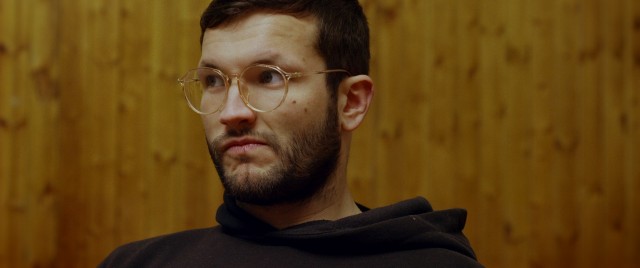Set at an improv class, where as an ice breaker the group plays a game of two truths and a lie, with their thematically complex short Doughnut, co-directors Liam White and Larry Ketang have created a storyline that leaves its audience with lots to unpack. As the evening takes an unexpected turn, after Patrick’s contribution leaves the rest of the participants on edge, the short’s thought-provoking narrative raises multiple questions and allows each viewer a unique perspective on what to make of events.
Having discussed Doughnut with many people, I found it quite incredible how we all get affected by the film differently, with the various layers of the screenplay impacting in contrasting ways. With this in mind, we were keen to hear from screenwriter (and co-director) Liam White and were not surprised when he admitted that many themes contributed to the general concept of the film. His initially starting point was the idea that upon meeting someone for the first time we very much take what they say as face value, realising this leaves a lot of room for manipulation, this triggered a deeper reflection on lies: “As time goes on, and we get to know someone better, the area in which we are able to lie starts to shrink, or at least shift… yet what people ‘know’ and think about you is shaped so much by what you say”.
“When I ask people ‘OK, what’s Doughnut about?’, I get a different answer every time”
While this lying game and the improv group setting form the perfect canvas for such a dark comedy and is fascinating from an anthropological point of view, it also subtly touches on the idea of whether people who have served their time should be forgiven and what is it ok to laugh about. As previously mentioned, the film can be interpreted in many ways, with some audience members leaning more towards the comedy, while others would be more horrified, reacting with uncomfortable feelings or awkwardness. Which was the intent of the filmmakers: “When I ask people ‘OK, what’s Doughnut about?’, I get a different answer every time”, White explains.
For such a layered screenplay to be effective, the audience has to remain engaged throughout the film and Ketang and White leave no stone unturned to ensure this happens. Taking the audience along on this wild ride, the filmmakers, along with DP Gareth Bowler, chose to employ an immersive approach with the cinematography placing their viewers in the room as if we were part of the group. The film is clearly structured in two parts, the first section playing with lighter comedy as the improv group awkwardly meets for the first time, with hints at the darker comedy set to come. A little bit before the halfway mark, the tone drastically changes and so does the visual style and the framing. Magnifying the tension that has now gripped the group, the directorial duo use close-ups to echo how all of a sudden everyone who heard Patrick is now taken aback and is fully alert. It’s a simple, but effective change.

Corin Silva as Patrick ensures the game of two truths and a lie takes an interesting turn.
While the chemistry between the entire cast captures just how odd it can feel starting a new activity, especially as an adult, the second part of the film heavily relies on Corin Silva’s performance as Patrick. As he goes from playing the game to defending himself in a situation where no one is willing to listen to what he has to say, the way he plays his character is essential in ensuring the short remains multi-layered and open to interpretation. Given the mounting tension in the room, the film ends on a quite anticlimactic note, but it’s his performance that means Doughnut wraps in an emotionally compelling fashion, giving the audience the room to analyze what they’ve just witnessed.
Since making Doughnut, the filmmakers have shot four new shorts! Keep your eyes out on the festival circuit for Tick Tick Tick, Punch-Drunk, Pickles and Department of Necrosis. Ketang and White, who operate under the Falsetooth Films moniker, are currently in the funding stage on a new short.

 Céline Roustan
Céline Roustan